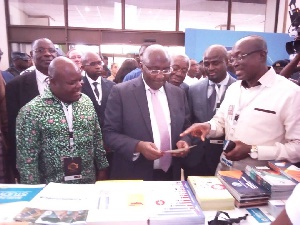Vice President Dr Mahamudu Bawumia has indicated that government has, as part of effort in making sure that Ghanaians pay less for power, resolved that, henceforth, the cost component of any agreement it will sign for electricity generation will be pegged around 10 cent per kilowatts hour (kWh).
He noted that despite the reduction in the cost of electricity between 10 and 30 % this year by the government, cost of electricity in Ghana, is still on the higher side as compared to other counties in the sub-region.
This, he explained, is because the power purchase agreements signed by the previous government with electricity generation companies cost as high as 18 cents per kWh.
"As a government, we inherited a number of Power Purchasing Agreements (PPAs) for the supply of renewable energy...some with tariffs as high as US18 cents . It is the goal of the government to bring down the cost of electricity generation to under US10 cents, in order to make electricity affordable to Ghanaians.
"One of the key challenges to be made, going forward, is that the Ministry of Energy and the Electricity Company of Ghana (ECG) have been tasked to use competitive tendering procedure for the procurement of renewable energy electricity. Under this scheme, the winner of the tender will be guaranteed a Power Purchasing Agreement, connection agreement and government enhancement to make it possible for the winner to easily reach financial close and ensure that the nation gets value for money in the procurement of renewable energy," he added.
Speaking at the 4th Renewable Energy Fair organised by the Energy Commission, in Accra, Dr Mahamudu Bawumia said government is concerned about the cost of electricity, hence, it is taking steps to increase renewable energy generation into Ghana's energy mix so that electricity becomes affordable.
He said government, in considering the importance of renewable energy, has supported the Volta River Authority (VRA) to establish 12 megawatts of solar power in Upper West and 75 megawatts wind power in Anloga in the Volta Region.
Touching on the theme: 'Exploiting Renewable Energy Resources at the District Level', Dr Mahamudu Bawumia urged the Energy Commission to assist various MMDAs to identify renewable energy sources in their jurisdictions and develop them to boost power generation to support government initiatives such as the Planting for Food and Jobs and One District, One Factory.
"One key advantage of the renewable energy is that it enables access to electricity for communities, especially farming communities and farms that are located far from national grid.
"Access to off grid electricity means that they can participate in wealth creation through their farming and related activities of agro processing. In the case of Planting for Food and Jobs, for example, renewable energy, in the form of solar or wind power water pumps, could be used to guarantee all year-round farming," he concluded.
Business News of Thursday, 11 October 2018
Source: Michael Creg Afful
Cost of future Power Purchasing Agreements will be pegged around 10 cents - Bawumia
Entertainment












